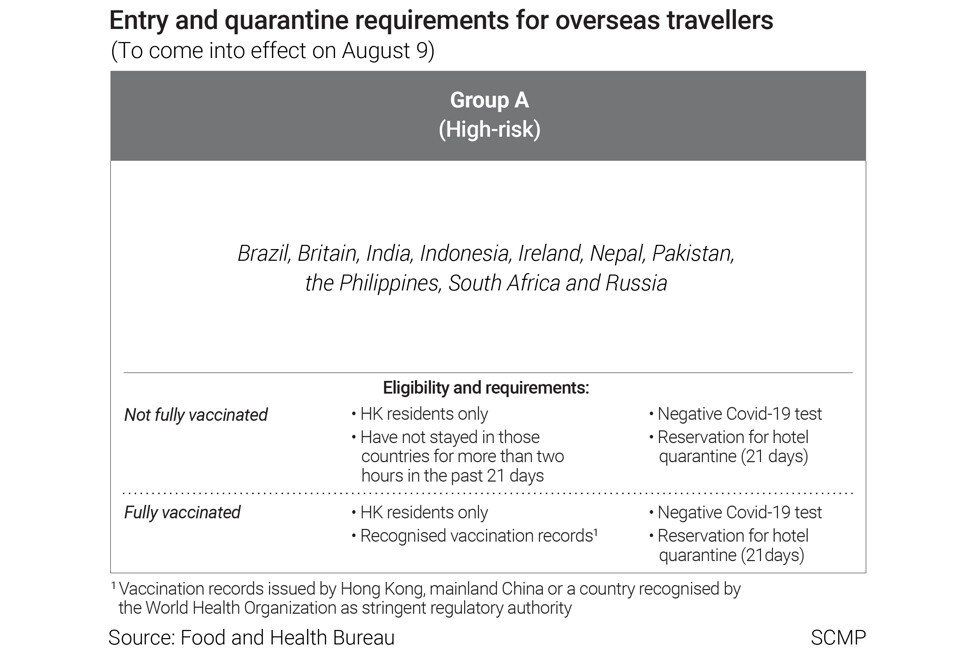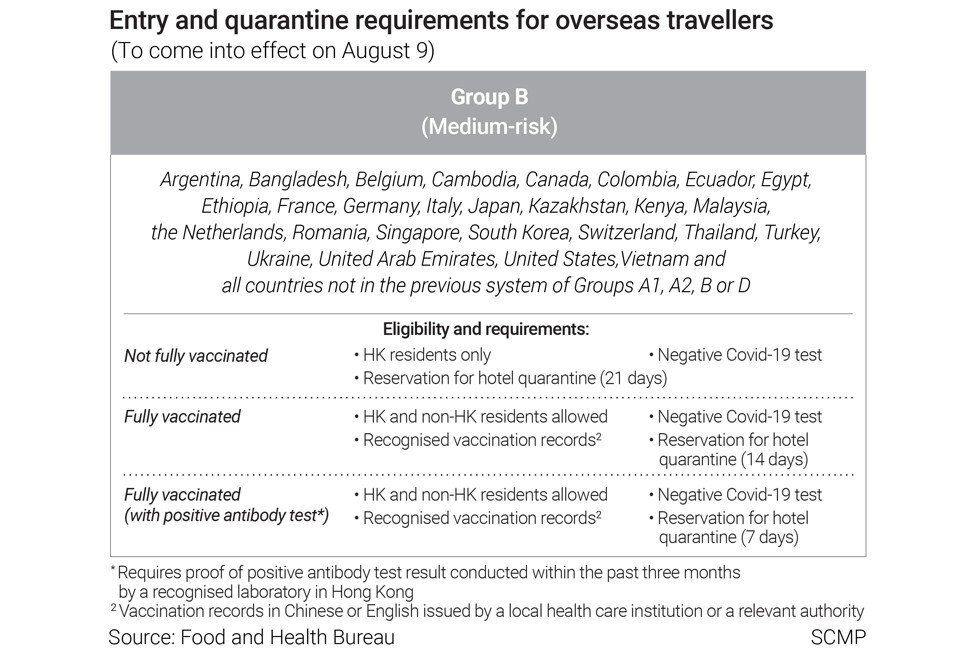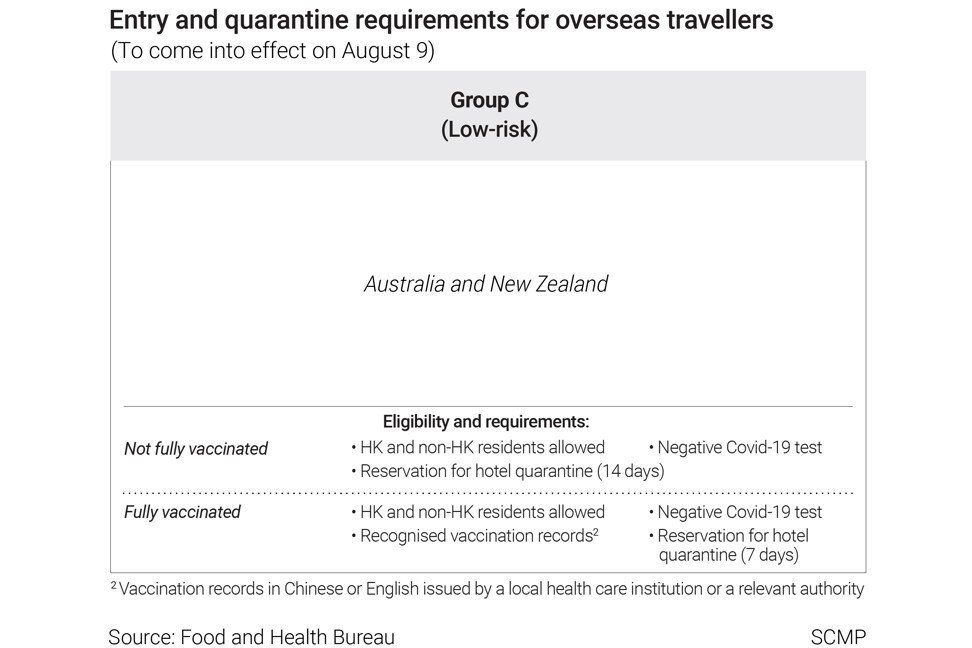
Hong Kong is revamping Covid-19 entry rules – here’s what you need to know
Hong Kong has streamlined its categorisation of places deemed Covid-19 risks, condensing a five-tier system into three risk levels – high, medium and low – and changed travel rules for overseas arrivals.
Countries currently categorised as extremely or very high risk will be consolidated into a new top tier labelled as “high risk”, while those currently deemed high- and medium-risk will be merged into a new medium-risk tier that will include most countries.
With the new measures kicking in next Monday, the Post unpacks what you need to know about the latest rules.
In general, what rules have been relaxed or tightened?
All arrivals must show a negative Covid-19 test taken 72 hours before their flight. In the past, some vaccinated travellers were exempted from the requirement.
Under the new measures, only fully vaccinated Hong Kong residents can fly in from high-risk countries, such as Britain, the Philippines and Indonesia.
Fully vaccinated non-residents can enter the city from medium-risk countries, such as Singapore, Japan and the United States. Previously, only non-residents – regardless of vaccination status – who arrived from low-risk countries, namely Australia and New Zealand, were allowed to do so.
Children under the age of 12 can serve part of their quarantine at home if household members are fully vaccinated. In the past, unvaccinated children returning to Hong Kong had to spend their entire quarantine period at a designated hotel, even if their parents were eligible for a reduced stay.
Do I need to be fully vaccinated to travel to Hong Kong?
Residents who are not fully vaccinated can return to the city if they have stayed in a medium-risk place in the past 14 days. They must quarantine for three weeks in a designated hotel and take four Covid-19 tests during that period.
Hongkongers and non-residents can also enter the city from low-risk countries even if they are not fully vaccinated. Arrivals will have to undergo 14 days of hotel quarantine and take three Covid-19 tests during that period. They will also have to self-monitor for seven days after the two-week quarantine and get screened on the 16th and 19th days of arrival in Hong Kong.
But only fully vaccinated residents are allowed to board flights to the city from high-risk countries. For these places, the city will only recognise travellers’ vaccinations if they have been jabbed in Hong Kong or mainland China, or got a shot from an institution recognised by the World Health Organization. Only Britain and Ireland fit the criteria.
Vaccination certificates issued by local health authorities will, however, be accepted for medium- and low-risk countries.
Where can non-residents fly in from?
Fully vaccinated non-residents who have stayed in medium-risk places in the past 14 days are allowed to board flights to the city.
Travellers will be required to quarantine at a designated hotel for two weeks and take three Covid-19 tests during that period. They will also have to self-monitor for seven days after the two-week quarantine and undergo compulsory screening on the 16th and 19th days of arrival in Hong Kong.

Those with a positive antibody test result will only need to quarantine for seven days at a designated quarantine hotel and take two Covid-19 tests during that period. They will also have to self-monitor during the subsequent week and undergo mandatory screening on the 9th, 12th, 16th and 19th days of arrival in Hong Kong.
Non-residents who have stayed in low-risk countries during the past 14 days can also enter the city.
People who are fully vaccinated will be required to quarantine for seven days and take two Covid-19 tests during that period. They will also have to self-monitor during the subsequent week and undergo mandatory screening on the 9th and 12th days of arrival in Hong Kong.

Meanwhile, those who are not will need to quarantine for two weeks and take three Covid-19 tests during that period. They will also have to self-monitor during the subsequent seven days and undergo mandatory screening on the 16th and 19th days of arrival in Hong Kong.

Who qualifies for a shortened seven-day quarantine?
To be eligible for the shortened period, fully vaccinated travellers from medium-risk countries who have a positive local antibody test can halve their hotel quarantine and self-monitor for the subsequent seven days. They must also undergo compulsory testing on the 9th, 12th, 16th and 19th day of arrival in Hong Kong. The antibody test must be conducted by an officially accredited lab in Hong Kong and is valid for three months.
Officials are expected to introduce a self-paid antibody test on arrival at the city’s airport in mid-August.
Fully vaccinated travellers from low-risk countries are also eligible for one-week quarantine at a designated hotel and must take two Covid-19 tests during that period. They will also need to undergo mandatory screening on the 9th and 12th days of arrival in Hong Kong.
What if I’m in a high-risk country?
Hongkongers who have been in a high-risk country in the past 21 days can only return to the city if they are fully vaccinated. Travellers are required to quarantine for 21 days in a designated hotel and take four Covid-19 tests during the period. They must self-monitor for the subsequent week and undergo compulsory screening on the 26th day of arrival in Hong Kong.
Alternatively, people can choose to go to a medium- or low-risk country, from which residents and non-residents are allowed to travel to Hong Kong, for at least three weeks to serve a shorter quarantine period in a designated hotel. But the shortened isolation period does not apply to unvaccinated individuals travelling from a medium-risk country to Hong Kong.
What about children who are unvaccinated?
For high-risk countries, residents’ children who are under the age of 12 will be allowed to return to the city with fully vaccinated Hongkongers.
Travellers will be required to quarantine for 21 days at a designated hotel and take four Covid-19 tests during that period. They will also have to self-monitor in the subsequent week and undergo screening on the 26th day of arrival in Hong Kong.
For medium- and low-risk places, children below the age of 12 who travel and undergo hotel quarantine with fully vaccinated people are eligible for a shorter stay at the hotel.
They can then self-isolate at home until the end of their quarantine period – 21 days for medium-risk places and 14 days for low-risk ones – on the condition that all household members of the minor have been fully vaccinated. The child also cannot have contact with anyone who has not been fully vaccinated.
Currently, unvaccinated children returning home must serve out their entire quarantine period, which runs between two and three weeks depending on where they are coming from, at a hotel, even if their parents are eligible for a reduced stay. Their guardians can choose to stay with their children for the duration of the isolation.
What about foreign domestic workers?
Domestic workers from Indonesia and the Philippines – both of which were previously categorised under the highest level of risk – had been barred from entering Hong Kong, but will be able to come to the city under the new rules as long as they were vaccinated here.
Helpers between contracts who are still in the city will also be able to travel home and return as long as they, too, were immunised in Hong Kong. All of them will be required to quarantine for 21 days at two designated hotels upon arrival.
Officials are in talks with consulates on how to confirm the authenticity of vaccination records in the workers’ home countries and enable helpers who have been vaccinated to travel to Hong Kong.










